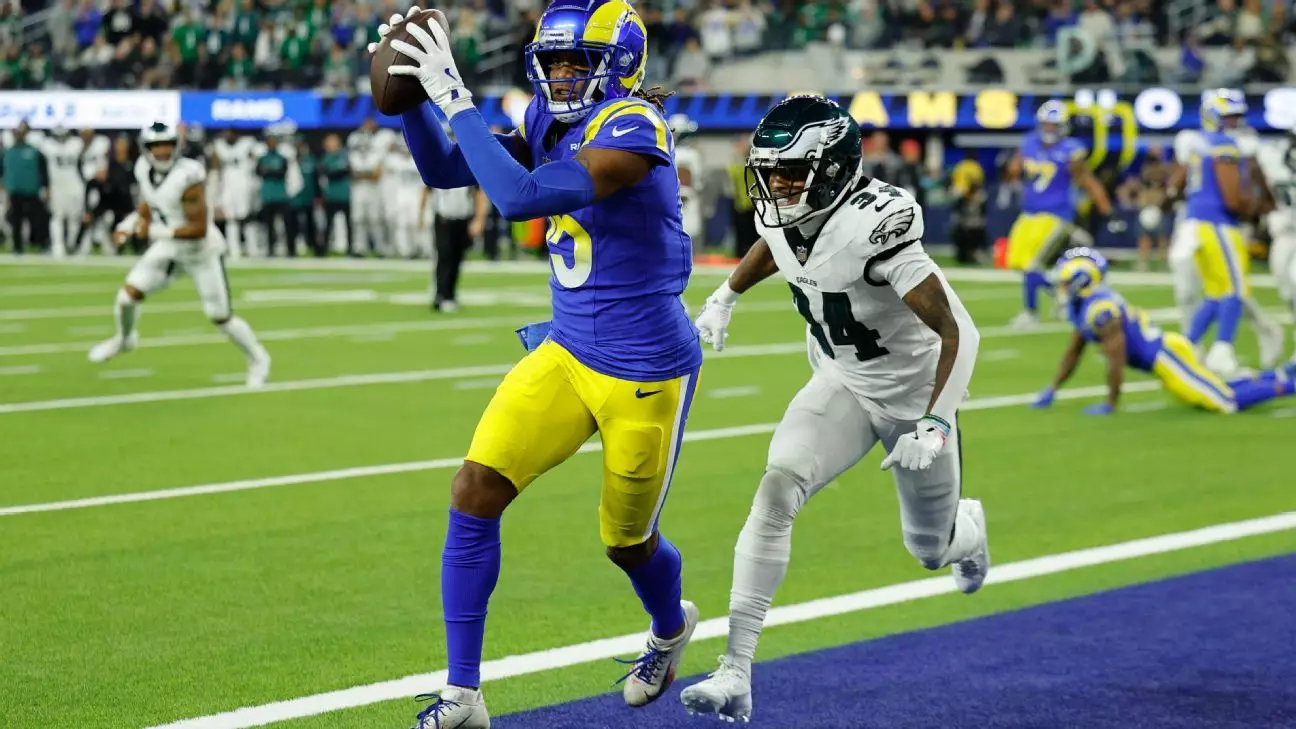In the world of professional sports, athletes often find themselves in the spotlight, not only for their athletic abilities but also for their behaviors off the field. This was the case for Demarcus Robinson, a wide receiver for the Los Angeles Rams, who was arrested under suspicion for driving under the influence (DUI). The incident occurred in the early hours of Monday morning after Robinson was clocked driving over 100 mph on U.S. 101, a highway known for its busy traffic and strict enforcement of speed limits. Interestingly, this arrest came just hours after Robinson made a notable contribution to his team by scoring a touchdown in a game against the Philadelphia Eagles. This juxtaposition of triumph on the field and recklessness off it raises questions about the pressures athletes face and the personal decisions they make in the limelight.
In response to the incident, Rams head coach Sean McVay announced that the team would not impose a suspension on Robinson for the upcoming game against the New Orleans Saints. This decision reflects a cautious approach from the organization, as they choose to allow the legal process to unfold before making further judgments. McVay emphasized the importance of understanding the severity of the situation, particularly noting the potential consequences that could have arisen from Robinson’s actions. He expressed a belief that Robinson is genuinely remorseful, highlighting the player’s ability to accept responsibility during team meetings. This demonstrates a commitment from the Rams’ organization not only to support Robinson through this challenging time but also to use it as a learning opportunity for the entire team.
Implications for Player Behavior and Accountability
Robinson’s situation serves as a poignant reminder of the need for player accountability in professional sports. While McVay acknowledged that the incident does not define Robinson as a person, it is crucial for both players and organizations to recognize the implications of such behaviors on public perception and team morale. Robinson himself addressed the gravity of the situation by stating that he did not want to tarnish the reputation of the Rams or bring negative energy to the team. His public acknowledgment of the severity of his actions can resonate deeply within the locker room and set a precedent for others in similar positions.
Moreover, it poses an opportunity for a broader discussion about the responsibility athletes bear as public figures. In an age where social media amplifies both achievements and missteps, the repercussions of personal actions become magnified. Robinson’s candid statement about learning from the incident reflects a necessary mindset that athletes must adopt to cultivate a culture of growth and introspection within their teams.
The aftermath of Robinson’s arrest will likely serve as a vital turning point not only for him but also for the Los Angeles Rams and potentially the NFL as a whole. As Robinson reflected on his missteps, he emphasized the need for teammates to learn from his experience without directly facing similar consequences. This sentiment echoes a growing awareness in professional sports regarding the significance of mentorship and accountability. The structure of team dynamics often provides a unique platform for players to support one another, fostering an environment where accountability is shared collectively.
The NFL’s disciplinary process remains an unknown factor, as Robinson has yet to receive definitive communication from the league about potential consequences. This uncertainty adds another layer of complexity to the situation, as teams navigate the delicate balance between supporting players and maintaining accountability.
Robinson’s incident is a complex scenario that invites deeper reflection on the pressures of life as a professional athlete. For the Rams, it outlines a critical moment for internal growth and adjustment, presenting an opportunity for the organization to reinforce its values regarding personal conduct. As they prepare for their next game, the team must grapple with the impact of Robinson’s actions, both on the field and off it. Moreover, it emphasizes a broader narrative within sports about the importance of learning from past actions, showcasing that even in moments of significant error, growth and better decision-making can emerge in the aftermath.

